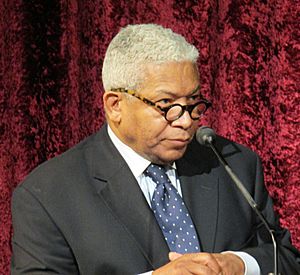Eugene Rivers facts for kids
Quick facts for kids Eugene F. Rivers |
|
|---|---|
 |
|
| Personal details | |
| Born | April 9, 1950 |
| Nationality | American |
| Denomination | Pentecostal |
| Spouse | Jacqueline Rivers |
| Profession | Azusa Christian Community |
| Education |
|
Eugene "Rib" F. Rivers III (born April 9, 1950) is an American activist and Pentecostal minister. He is based in Boston, Massachusetts.
Rivers is well-known for creating programs that help reduce violence in cities. He has also been a leader in helping Black communities grow economically and improving urban areas.
Contents
Biography
Eugene Franklin Rivers, III, was born in Boston, Massachusetts, on April 9, 1950. His parents were Eugene F. Rivers II and Mildred Bell Rivers. He grew up in Chicago, Illinois, and Philadelphia, Pennsylvania. Rivers went to Murrell Dobbins Vocational High School. There, he was on the gymnastics team and studied commercial art. His classmates gave him the nickname "Rib." He finished high school in 1968.
After high school, Rivers became involved in activism in Philadelphia. He joined movements connected to the Black church that focused on economic growth and improving cities. He supported efforts to get help for Black communities from churches and synagogues in the United States.
In 1974, a documentary called Black at Yale: A Film Diary was made about Rivers. The film showed his attempts to get into Yale University. He was never a student, teacher, or staff member at Yale University.
Rivers moved to Boston in 1978. He wanted to attend Harvard University as an older student. He was encouraged to apply, but like with Yale, he never graduated from Harvard University. In 1984, he started the Azusa Christian Community in Dorchester. He became its pastor. He also founded the Ella J. Baker House in Dorchester. This was a community center for young people.
Rivers was worried about gang violence and young people being killed by guns. So, he joined other Black clergy members to start the Boston TenPoint Coalition in 1992. The Coalition worked to reduce violence in Boston's neighborhoods. This time became known as the "Boston Miracle." Rivers became a co-chair of the National TenPoint Leadership Foundation. He was seen as an expert on ways to reduce violence that affects African Americans.
Rivers met with George H.W. Bush to talk about city issues. He has also appeared on national television shows. He was featured on the cover of Newsweek magazine in 1998. He was also written about in Commonwealth Magazine in 1999.
Rivers' essay The Responsibility of Black Intellectuals in the Age of Crack was published in the Boston Review. This led to discussions in New England.
Views
Rivers has conservative political views. He has traditional views on certain social issues.
Rivers has often described himself as a "secret ops" player in Boston-area politics. He believes the Black community should be responsible citizens. He encourages them to be involved in politics.
Family
Rivers is married to Jacqueline Olga Cooke-Rivers. She earned her PhD at Harvard University.
Rivers' parents, Mildred Bell Rivers and Eugene F. Rivers, Jr., were members of the Nation of Islam. They met as students at the Colored Normal Industrial Agricultural and Mechanical College of South Carolina. Both of his parents served in the U.S. military during World War II.
Mose Rivers, Eugene's great-grandfather on his father's side, was born a slave.
See also
- GTA Faith Alliance
- The Toronto Rap Project
Images for kids
 | Emma Amos |
 | Edward Mitchell Bannister |
 | Larry D. Alexander |
 | Ernie Barnes |

